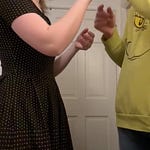Imitation is often said to be the highest form of flattery, but in the world of education and inclusion, it’s also a powerful tool for growth. Research consistently shows that students with disabilities thrive when they have nondisabled peers as models and mentors. And the benefits go both ways—peer models often develop stronger advocacy skills, positive perceptions of their classmates with disabilities, and even see academic gains.
Building inclusive school communities takes intention, and there are many strategies to foster meaningful peer relationships. Have you tried any of these approaches?
Social Skills Groups
Peer Buddies, Models, or Networks
"Tootles" (Peer-to-Peer Behavior Specific Praise)
Peer Initiation Training
Peer Supports
Peers often want to help but may not always know how. By offering training, modeling, and opportunities for practice and feedback, we can empower students to connect, support, and build true friendships. When we create these opportunities, we’re not just teaching skills—we’re cultivating belonging and connection.
What strategies have you seen—or would you like to see—to build meaningful peer relationships in your community?












Share this post